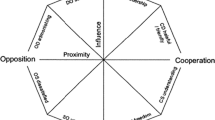Abstract
Increasingly in elementary schools, there has been a focus on the influence of school-level factors on students’ learning. The way in which the learning environment is organised in schools and classrooms is likely to influence students’ opportunities to carry out inquiry. Most studies have focused on the effects of the amount of schooling, rather than effects attributable to support for inquiry in the school context. This study clarifies aspects of school contexts that support inquiry at the school level and describes the development of an inventory to assess school contexts. The Primary School Characteristics Inventory has three components named Motivation for Student Inquiry, Organisational Structures to Support Inquiry and Structures to Support Inquiry Strategies in School. The instrument was effective for identifying schools with varying levels of support for inquiry, suggesting that some schools might need to modify the school context if students are to carry out inquiry in a self-directed way.

Similar content being viewed by others
References
Boekaerts, M., Pintrich, P., & Zeidner, M. (2000). Introduction. In M. Boekaerts, P. Pintrich, & M. Zeidner (Eds.), Handbook of self-regulation (pp. 1–9). San Diego, CA: Academic Press.
Bransford, J. D., Brown, A. L., & Cocking, R. R. (Eds.). (1999). How people learn: Brain, mind, experience and school. Washington, DC: National Academy Press.
Department of Education, Training & Employment (DETE). (2001). South Australian Curriculum Standards and Accountability Frameworks (SACSA). Seacombe Gardens, Australia: Curriculum Resources Unit.
Eccles, J. S. (2005). Commentary: Studying the development of learning and task motivation. Learning and Instruction, 15, 161–171.
Fraser, B. J., & Fisher, D. L. (1994, April). Assessing researching the classroom environment. Paper presented at the annual meeting of the American Educational Research Association, New Orleans, LA.
Fraser, B. J., McRobbie, C. J., & Fisher, D. L. (1996, November). Personal and class forms of a new classroom environment questionnaire. Paper presented at the conference of the Educational Research Association, Singapore and the Australian Association of Research in Education, Singapore.
Grady, N. B., & Fisher, D. L. (1993, November). Teachers’ images of their schools, as revealed by metaphor, and students’ perceptions of their classroom environment. Paper presented at the annual conference of the Australian Association for Research in Education, Perth, Australia.
Hinkle, D. E., Wiersma, W., & Jurs, S. G. (1994). Applied statistics for the behavioral sciences (3rd ed.). Boston, MA: Houghton Mifflin Co.
Keeves, J. P., & Alagumalai, S. (1999). New approaches to measurement. In G. N. Masters & J. P. Keeves (Eds.), Advances in measurement in educational research and assessment (pp. 23–42). New York: Pergamon.
Knowles, M. (1975). Self-directed learning: A guide for learners and teachers. Chicago: Association Press and Follett Publishing Company.
Perry, K. E., & Weinstein, R. S. (1998). The social context of early schooling and children’s school adjustment. Educational Psychologist, 33, 177–194.
Pintrich, P. R. (2003). A motivational science perspective on the role of motivation in learning and teaching contexts. Journal of Educational Psychology, 95(4), 667–686.
Pintrich, P., & DeGroot, E. (1990). Motivational and self-regulated learning components of classroom academic performance. Journal of Educational Psychology, 82(1), 33–40.
Rhine, S. (1998). The role of research and teachers’ knowledge base in professional development. Educational Researcher, 27(5), 27–31.
Rutter, M., & Maughan, B. (2002). School effectiveness findings 1979–2002. Journal of School Psychology, 40, 451–475.
Sheridan, B., Andrich, D., & Luo, G. (1996). RUMM Rasch Unidimensional Measurement Models. Perth, Australia: Murdoch University.
SPSS. (2001). SPSS for Windows, Version 11.0. Chicago: SPSS Inc.
Sternberg, R. J. (2000). Making school reform work: A mineralogical theory of school modifiability. Bloomington, IN: Phi Delta Kappa Educational Foundation.
Treffinger, D. J. (1993). Fostering effective independent learning through individualized programming. In J. S. Renzulli (Ed.), Systems and models for developing programs for the gifted and talented (pp. 429–460). Cheltenham, Australia: Hawker Brownlow.
Wigfield, A., Eccles, J. S., & Rodriguez, D. (1998). The development of children’s motivation in school contexts. In D. P. Pearson & A. Iran-Nejad (Eds.), Review of research in education (pp. 73–118). Washington, DC: American Educational Research Association.
Author information
Authors and Affiliations
Corresponding author
Appendix
Appendix
Rights and permissions
About this article
Cite this article
Van Deur, P. Assessing elementary school support for inquiry. Learning Environ Res 13, 159–172 (2010). https://doi.org/10.1007/s10984-010-9070-y
Received:
Accepted:
Published:
Issue Date:
DOI: https://doi.org/10.1007/s10984-010-9070-y




